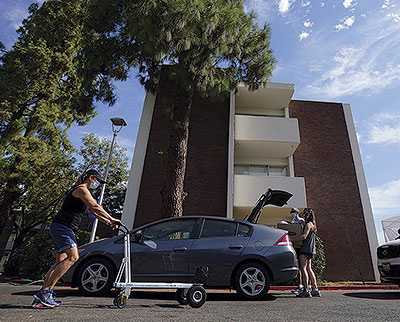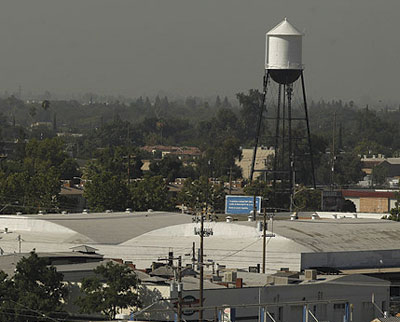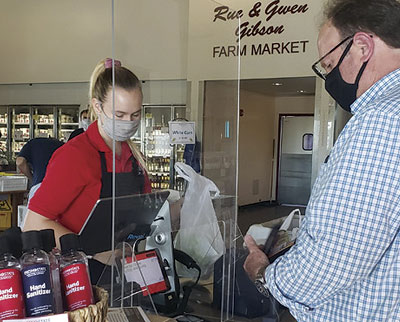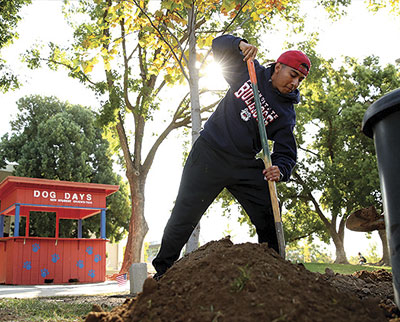Fresno State News Briefs
Researchers Simulate Virus Spread
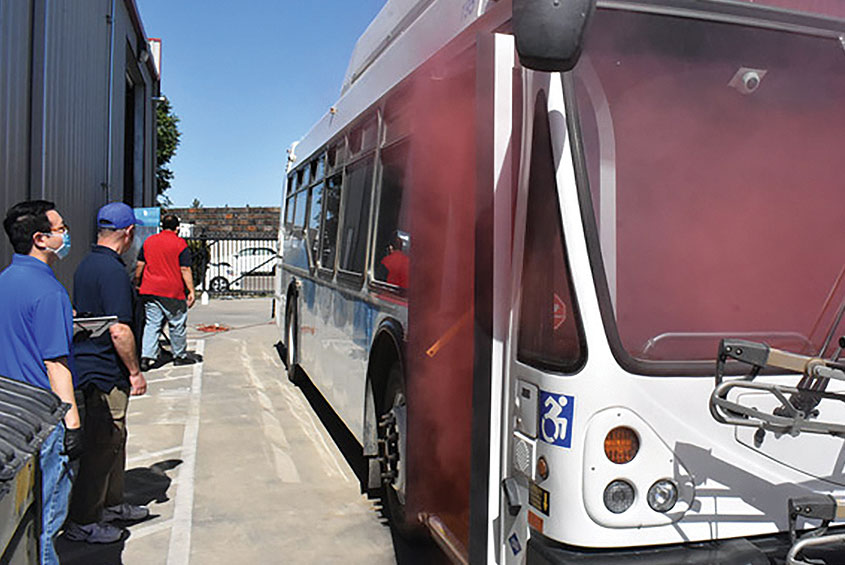
Clouds of white and pink smoke loom from the windows of a Fresno County Rural Transit Authority electric bus in a Selma transportation yard during an airflow simulation study. Sitting inside — 6 feet away from one another — is a masked, multidisciplinary team of researchers and industry professionals working to understand how COVID-19 could be spread on modes of public transportation. The smoke generated by non-toxic candles is being used to simulate the movement of airflow and airborne contamination — one of many tests being used to understand and quantify both air circulation as well as virus mitigation inside the bus.
“This study aims to understand air circulation patterns inside the cabins of busses, as well as test the impact of different approaches in mitigating potential virus circulation and infection,” says Dr. Aly Tawfik, associate professor of civil engineering in the Lyles College of Engineering at Fresno State and founding director of the Fresno State Transportation Institute.
Tawfik and Dr. Deify Law, associate professor of mechanical engineering at Fresno State, were part of a research team that included Dr. Juris Grasis, assistant professor in molecular and cell biology at University of California, Merced, and several industry partners. Law provided full HVAC data including air and smoke circulation behavior, air speed, static pressure, temperature and relative humidity.
“This will allow us to investigate the dynamics of ventilation flow and the airborne contamination in a scenario of a COVID-19 infected person who was breathing or coughing inside a transit bus,” Law says. “I am very optimistic that this research will make an impact on the future of public transportation. I see now is the time to reevaluate the HVAC design of public transportation, especially the locations of supply and return air grilles relative to the seating area of the driver and passengers.”
— Rebecca Wass
Seedlings from Hiroshima
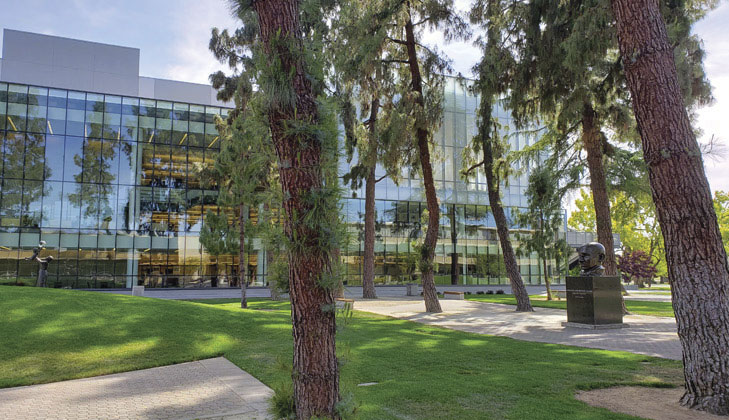 At 8:15 a.m. on Aug. 6, 1945, an atomic bombing in Hiroshima, Japan instantly killed about 70,000 people, according to the U.S. Department of Energy. Tens of thousands more would die by the end of the year due to the effects of radioactive fallout. Except for a few buildings, the city was leveled.
At 8:15 a.m. on Aug. 6, 1945, an atomic bombing in Hiroshima, Japan instantly killed about 70,000 people, according to the U.S. Department of Energy. Tens of thousands more would die by the end of the year due to the effects of radioactive fallout. Except for a few buildings, the city was leveled.
Less than three-quarters of a mile from ground zero, in the shadow of Hiroshima Castle, a camphor tree was damaged and bent by the blast but remained standing. It was one of 170 hibakujumoku, a Japanese term meaning atomic-bombed tree, that survived the cataclysm. They would become symbols of peace and hope.
Three seedlings from this tree were planted on Aug. 6 outside the Henry Madden Library to commemorate the 75th anniversary of the atomic bombing of Hiroshima and Nagasaki, remember those who died and instill hope that nuclear weapons are never used again.
“We are honored that our Peace Garden will be home to such special trees — trees whose ancestral memory imparts insight about life, hope and the human power to envision a harmonious future,” says Fresno State Provost Saúl Jiménez-Sandoval.
The seeds from the parent tree (No. 17) were collected by the Green Legacy Hiroshima, and eventually sent to California Health Sciences University for distribution in the Central Valley with the help of the local Japanese-American community.
— Benjamin Kirk
Introducing the Alumni Vintners Wine Club
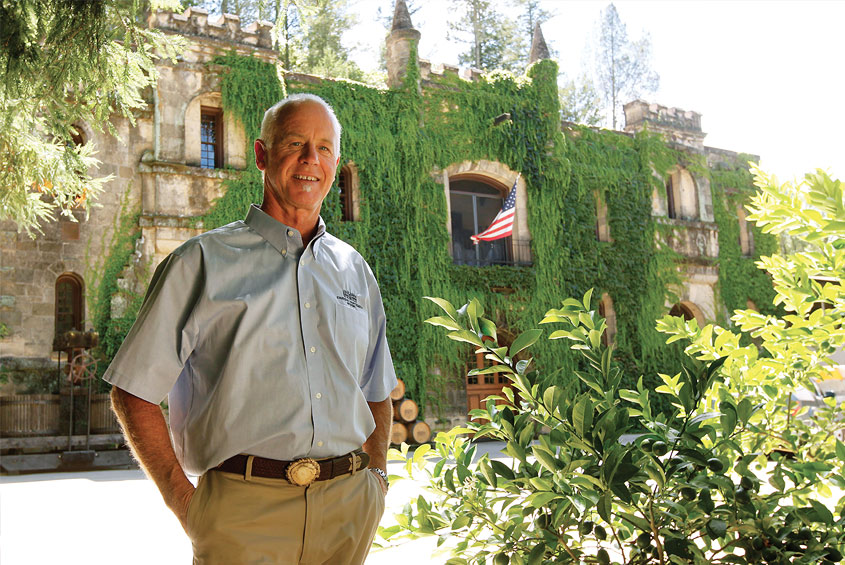 Ever wonder which well-known wines are produced with the help of Fresno State alumni? Now, there’s a fun way to find out – the Fresno State Winery created the Alumni Vintners Wine Club to unite wine enthusiasts and alumni.
Ever wonder which well-known wines are produced with the help of Fresno State alumni? Now, there’s a fun way to find out – the Fresno State Winery created the Alumni Vintners Wine Club to unite wine enthusiasts and alumni.
The club’s October selection featured Chateau Montelena wines from Napa Valley. Chateau Montelena and its CEO and president Bo Barrett (left), a Fresno State alumnus, were featured in the 2008 film “Bottle Shock” — a Napa Valley love story highlighting the rise of California wines.
Club deliveries will occur three times a year in the same delivery time frame as normal wine-club shipments. The next shipment, in February, will feature Toca Madera Winery (Madera) and the selections of alumnus winemaker Shayne Vetter.
Canned wine now available
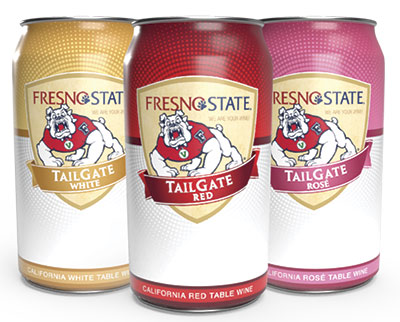 In other recent winery news, the Jordan College of Agricultural Sciences and Technology introduced its first canned wine selection in September with its Tailgate series. Consumers can now purchase 12.7-ounce cans, half the size of a normal wine bottle, at the Gibson Farm Market on campus. Each can sells for $3.50 or $14 for a four-pack. The cans are also available locally at restaurants and stores such as the Clovis Meat Market, Fresno Meat Market, Mar Val in Prather, The Market and Simonian Farms.
In other recent winery news, the Jordan College of Agricultural Sciences and Technology introduced its first canned wine selection in September with its Tailgate series. Consumers can now purchase 12.7-ounce cans, half the size of a normal wine bottle, at the Gibson Farm Market on campus. Each can sells for $3.50 or $14 for a four-pack. The cans are also available locally at restaurants and stores such as the Clovis Meat Market, Fresno Meat Market, Mar Val in Prather, The Market and Simonian Farms.
The red wine is blended from Barbera and Cabernet Sauvignon varieties; the white wine is a mix of Albariño and Muscat varieties; and the rosé is from its Syrah variety.
— Geoff Thurner
 Around the Fountain
Around the Fountain
Perenchio Foundation Gifts $5.5M
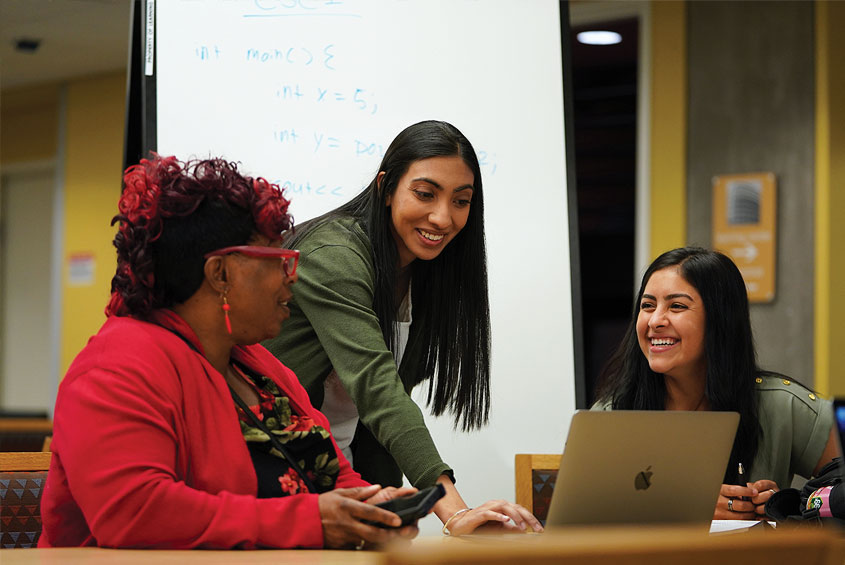 Fresno State students facing a financial hardship on the road to academic success will soon be able to apply for more grants and scholarships thanks to two gifts totaling $5.5 million from the Perenchio Foundation, which was established through the estate of an entertainment executive who has long supported the University.
Fresno State students facing a financial hardship on the road to academic success will soon be able to apply for more grants and scholarships thanks to two gifts totaling $5.5 million from the Perenchio Foundation, which was established through the estate of an entertainment executive who has long supported the University.
The Perenchio Foundation, which aligns support with the philanthropic wishes of Jerrold “Jerry” Perenchio, who died in 2017, donated $500,000 to the Good Samaritan Fund to help students who have faced unexpected financial roadblocks during the 2020-21 academic year. The foundation also donated $5 million to create the Perenchio Family Endowed Scholarship Fund to support Fresno State students from all backgrounds and majors, including “Dreamers,” immigrants who were brought to the U.S. as children.
“By helping to remove barriers to achieving a college degree, the Perenchio Foundation is profoundly transforming the lives of current and future students, our next generation of leaders, thereby making a lasting gift to the hometown that gave Mr. Perenchio his start in life,” says Fresno State President Joseph I. Castro.
The Perenchio scholarships will first be awarded in the 2021-22 academic year to freshmen and sophomores to encourage retention, and juniors and seniors to increase degree completion.
Perenchio, whose grandparents emigrated from Italy, was born in Fresno. His family owned the Fresno Grape Exchange and the Crestview Winery. He earned a bachelor’s degree from UCLA before joining the United States Air Force and becoming a jet-fighter pilot. Following his honorable discharge, Perenchio established his career in the entertainment and communications industries.
In 2011, Perenchio was awarded an honorary doctorate of fine arts at Fresno State’s centennial commencement. After accepting the degree, Perenchio encouraged the graduates to dream big and said success could be theirs as it was his with “lots of hard work, perseverance, mentoring, faith, ambition and a good dose of luck.”
— BoNhia Lee
Supporting Future Health Leaders
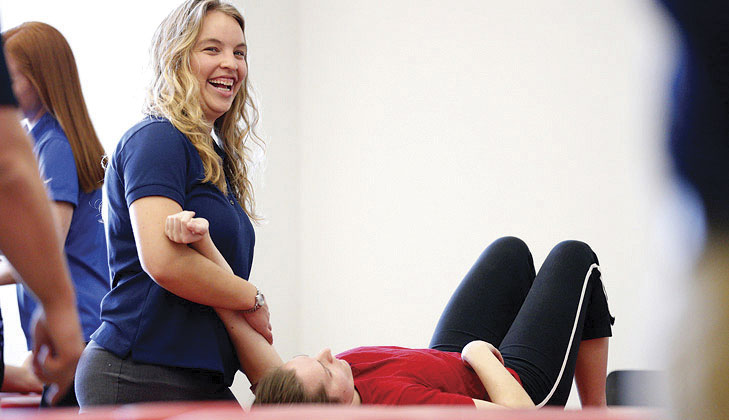 Each year, over 5,500 students at Fresno State declare majors in health care-related fields — with a majority of those students staying and serving in the Central Valley long after graduating.
Each year, over 5,500 students at Fresno State declare majors in health care-related fields — with a majority of those students staying and serving in the Central Valley long after graduating.
CalViva Health is creating opportunities for these future health care leaders with a $200,000 gift to fund scholarships that will empower future physicians, nurses, physical therapists, social workers and other students studying in health care-related majors on campus.
“We are happy to invest in future qualified health care professionals who will, in turn, serve our region,” says Greg Hund, CEO for CalViva Health. “It is a known fact that the Central Valley is in dire need of health care providers, and we believe in reinvesting back into our community to help ensure our provider needs are met.”
CalViva Health’s gift has the potential to help students like recent biochemistry graduate Bagieng Keophimphone, a son of Laotian refugees who saw firsthand the struggles his father faced in receiving quality care, or those like social work graduate James Borunda, who faced many personal hardships throughout life that inspired him to become a strong advocate for others in his community.
A total of 41 students have been offered the scholarship for the fall 2020 semester.
CalViva Health — a locally managed public health care plan — serves Fresno, Kings and Madera counties, and strives to provide access to quality, cost-effective health care throughout the region.
— Melissa Tav
1 of 10 to Earn Global Fellowship
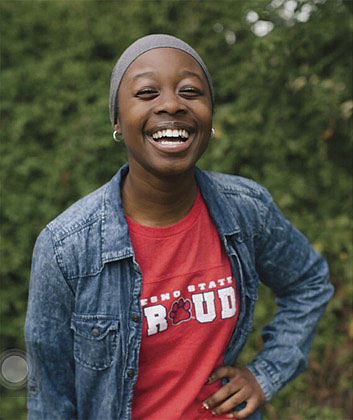 Fresno State sophomore Mistique Davis (left) was selected as a 2020 Frederick Douglass Global Fellow, earning a scholarship to study abroad in Cape Town, South Africa (tentatively scheduled for July 2021). She is one of 10 college students across the nation — out of 2,000 applicants — to earn the prestigious fellowship.
Fresno State sophomore Mistique Davis (left) was selected as a 2020 Frederick Douglass Global Fellow, earning a scholarship to study abroad in Cape Town, South Africa (tentatively scheduled for July 2021). She is one of 10 college students across the nation — out of 2,000 applicants — to earn the prestigious fellowship.
“Now, more than ever, the world needs individuals with strong leadership skills who have the ability to work across cultural divides,” says James Pellow, president and CEO of the Council on International Exchange, the scholarship’s sponsor.
The fellowship launched in 2017 to expand access to international education for underrepresented students who exhibit strong leadership skills, a history of service to others and a commitment to social justice.
For Davis, receiving this fellowship now is significant as she has been a passionate and steadfast advocate for the Black Lives Matter movement. She helped to organize a series of peaceful protests with other youth organizers in Stockton, where she spent a majority of her childhood. As the vice president of the Fresno State NAACP chapter, Davis feels a personal responsibility to give back to her community.
“This fellowship is not [just] for me,” says Davis, who is studying exercise science and aspires to become a physical therapist. “It’s for my little sister. It’s for the people of Stockton, which is such an incredibly diverse community, and it’s for my black peers and classmates here at Fresno State. This gives me an opportunity to represent the University in a positive way.”
— Melissa Tav


